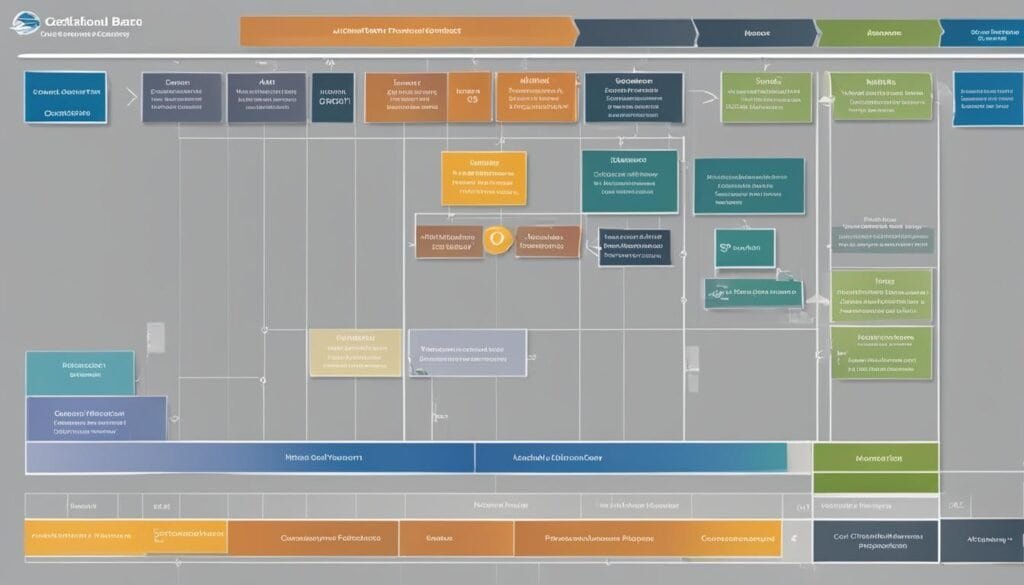National Board Certified Teacher (NBCT)
Did you know that National Board Certification is the highest certification available for teachers, signifying excellence in the field of education? It is a prestigious achievement that reflects a teacher’s commitment to professional growth, teacher leadership, and the highest educational standards.
Key Takeaways:
- National Board Certification is the highest certification available for teachers.
- It signifies excellence in education and a commitment to professional growth.
- Teachers who achieve National Board Certification are recognized as accomplished educators.
- This certification promotes ongoing improvement in schools across the United States.
- National Board Certification is based on the Five Core Propositions, outlining the qualities and skills of accomplished teachers.
What is National Board Certification?
National Board Certification is a prestigious professional certification available to accomplished teachers in the United States. It is designed to recognize and elevate the expertise of educators who have demonstrated exceptional teaching skills and a positive impact on student learning. The certification process is rigorous and evidence-based, focusing on the highest teaching standards to drive educational improvement and teacher recognition.
Created by teachers, for teachers, National Board Certification encompasses 25 certificate areas spanning 16 disciplines from Pre-K through 12th grade. This comprehensive certification process is based on the Five Core Propositions, which outline the qualities and skills of accomplished teachers.
“National Board Certification is an incredible recognition of accomplished teaching. It truly sets teachers apart and signifies their commitment to educational excellence.”
Accomplished teachers who pursue National Board Certification go through a reflective and evaluative process that requires the submission of evidence showcasing their impact on student learning. The certification process includes portfolio entries, documentation of teaching practices, and a comprehensive computer-based assessment.
Benefits of National Board Certification
- Validation of teaching excellence and accomplishment
- Enhanced professional growth and development opportunities
- Increased recognition and career advancement
- Expanded leadership opportunities and influence
- Join a network of accomplished teachers committed to educational improvement
By obtaining National Board Certification, teachers not only gain a valuable credential but also become part of a community of educators dedicated to continually improving their craft and making a significant impact on student learning.
National Board Certification vs. Traditional Teaching Certification
| National Board Certification | Traditional Teaching Certification | |
|---|---|---|
| Recognition | Recognizes teacher excellence and accomplishment | Confirms minimum competency |
| Evaluation | Evidence-based, rigorous, and holistic | Varies by state, may include standardized tests |
| Standardization | National teaching standards and Five Core Propositions | State-specific teaching standards |
| Professional Development | Focuses on ongoing growth and improvement | Varies by district and state requirements |
| Impact on Students | Emphasizes evidence of positive student outcomes | Focuses on completing required coursework |
The Certification Process
The certification process for National Board Certification consists of four components: three portfolio entries and a computer-based assessment. Throughout the process, teachers apply the National Board Standards to their classroom practice and connect with other teachers pursuing certification.
Portfolio Entries
Teachers are required to submit three portfolio entries as part of the National Board Certification process. These portfolio entries showcase evidence of the teacher’s content knowledge, differentiation in instruction, teaching practice and learning environment, and effectiveness as a reflective practitioner. The portfolio entries provide a comprehensive overview of the teacher’s abilities and their positive impact on student learning.
Computer-Based Assessment
In addition to the portfolio entries, teachers must complete a computer-based assessment. This assessment evaluates the teacher’s content knowledge and pedagogical skills. It includes multiple-choice questions and constructed-response items that assess the teacher’s ability to apply their knowledge and make instructional decisions based on the National Board Standards.
Throughout the certification process, teachers engage with the National Board Standards, which provide a framework for effective teaching practices. These standards serve as a guide for teachers to reflect on their instructional strategies and continuously improve their practice. By aligning their classroom approach with the National Board Standards, teachers can enhance their effectiveness as educators and ensure their students’ success.
Connecting with other teachers who are also pursuing National Board Certification is another important aspect of the certification process. Collaboration and sharing experiences with fellow educators allow teachers to gain insights, learn from best practices, and build a network of support within their professional community.
Eligibility Requirements
To be eligible for National Board Certification, teachers must meet certain requirements:
- Hold a valid state teaching license or meet the licensure requirements set by their state
- Possess a bachelor’s degree from an accredited institution
- Have a minimum of three years of teaching experience in an early childhood, elementary, middle, or secondary school
- World Language candidates must also meet an additional language proficiency requirement
Meeting these eligibility requirements ensures that teachers have the necessary qualifications and experience to pursue National Board Certification.
Educational Qualifications and Teaching Experience
Teachers seeking National Board Certification must have a bachelor’s degree from an accredited institution. This educational background provides the foundational knowledge necessary for effective teaching. Additionally, candidates must have a minimum of three years of teaching experience in an early childhood, elementary, middle, or secondary school. This requirement ensures that teachers have the practical experience and deep understanding of teaching methodologies.
Teaching License
A valid state teaching license is a prerequisite for National Board Certification. Teachers must either possess a valid license or meet the licensure requirements set by their state. The teaching license demonstrates that the candidate has met the necessary qualifications and standards to teach in their respective state. It ensures that teachers have the legal authorization to instruct students within the state’s education system.
Moreover, possessing a teaching license signifies that teachers have already undergone the necessary training and education required by their state. This prior preparation and adherence to state licensing requirements set a strong foundation for teachers pursuing National Board Certification.
Standards and Certificate Areas
The National Board Certification standards are grounded in the Five Core Propositions, which articulate the essential qualities and skills of accomplished teachers. These propositions serve as a guide for educators seeking to enhance their practice and achieve certification.
Teachers interested in pursuing National Board Certification should carefully review the available certificate areas and select one that aligns with their classroom specialty. By choosing a certificate area that reflects their expertise, teachers can focus on demonstrating their knowledge and skills in a specific content area or grade level.
To help teachers in their selection process, here are some of the certificate areas available:
- Early Childhood through Young Adulthood
- Early and Middle Childhood
- English as a New Language
- English Language Arts
- Exceptional Needs Specialist
- Generalist
- Mathematics
- Science
- World Languages
These certificate areas cover a range of disciplines and grade levels, allowing teachers to choose the one that aligns best with their teaching focus and expertise.
By pursuing National Board Certification in their chosen certificate area, teachers can showcase their mastery of specific content and instructional practices, enhancing their professional growth and credibility.
| Certificate Area | Description |
|---|---|
| Early Childhood through Young Adulthood | Focuses on teaching students from early childhood through young adulthood, across a variety of subjects and disciplines. |
| Early and Middle Childhood | Specializes in teaching students in the early and middle childhood grades. |
| English as a New Language | Focuses on teaching English language learners, supporting their language acquisition and academic success. |
| English Language Arts | Specializes in teaching English language arts, including reading, writing, speaking, and listening skills. |
| Exceptional Needs Specialist | Focuses on teaching students with exceptional needs, providing specialized instruction and support. |
| Generalist | Integrates knowledge and skills across multiple subjects, providing a well-rounded education for students. |
| Mathematics | Specializes in teaching mathematics, fostering problem-solving skills and mathematical reasoning. |
| Science | Focuses on teaching science, engaging students in inquiry-based learning and scientific exploration. |
| World Languages | Specializes in teaching world languages, promoting cultural understanding and language proficiency. |
The Four Components of the Certification Process
The certification process for National Board Certification consists of four components that assess different aspects of a teacher’s practice:
1. Content Knowledge
The content knowledge component focuses on a teacher’s deep understanding of the subject matter they teach and their ability to effectively convey that knowledge to their students. This component requires teachers to demonstrate their expertise in their specific content area through various assessments and documentation.
2. Differentiation in Instruction
The differentiation in instruction component evaluates a teacher’s ability to meet the diverse needs of their students by tailoring instruction to individual strengths, interests, and learning styles. Teachers must provide evidence of how they differentiate their instruction to engage and support all learners.
3. Teaching Practice and Learning Environment
The teaching practice and learning environment component focuses on the overall classroom environment created by the teacher and its impact on student learning. Teachers must demonstrate effective classroom management strategies, the establishment of a positive and inclusive learning community, and an engaging and rigorous instructional approach.
4. Reflective Practitioner
The reflective practitioner component evaluates a teacher’s commitment to ongoing professional growth and development. Teachers must provide evidence of their reflective practice, which includes analyzing their instruction, making adjustments based on student needs and data, and seeking feedback from colleagues and other stakeholders.
To achieve National Board Certification, teachers must carefully prepare and submit evidence that demonstrates their proficiency in each of these components. It requires a deep understanding of effective teaching practices and a commitment to continuous professional growth.
| Component | Tips |
|---|---|
| Content Knowledge | Provide examples of rigorous and relevant instructional materials, demonstrate in-depth knowledge through thoughtful analysis of student work, and showcase your ability to differentiate instruction based on student needs. |
| Differentiation in Instruction | Showcase your use of varied instructional strategies and resources, provide evidence of individualized learning plans and interventions for diverse learners, and highlight your ability to provide meaningful feedback and support for student growth. |
| Teaching Practice and Learning Environment | Show evidence of classroom management strategies, community-building activities, and student-centered instructional practices. Include examples of engaging and rigorous lessons, and highlight your ability to create a safe and inclusive learning environment. |
| Reflective Practitioner | Document instances of reflection on your teaching practice, such as analysis of student data, implementation of instructional changes based on feedback, and collaboration with colleagues to improve instruction. Provide examples of how you integrate research and best practices into your teaching. |
Certification Timeline and Scoring
The National Board Certification process provides flexibility for candidates to submit the four components in any order. This allows teachers to tailor their certification journey to their individual strengths and preferences. Additionally, the certification timeline provides teachers with a five-year window to achieve certification, allowing for a comprehensive and thoughtful approach to the process.
All purchased components must be completed during the assessment cycle in which they are purchased. This ensures that candidates have ample time to gather evidence, reflect on their practice, and submit their work for evaluation. The assessment cycle is a well-structured timeframe that ensures consistency and fairness in the certification process.
Once the components are submitted, they are scored by a team of trained assessors. Each component is evaluated against the specific criteria outlined in the National Board Standards. The scoring process is rigorous and thorough, ensuring that candidates are assessed against high-quality standards of accomplished teaching.
Scoring of components occurs each summer, and candidates can expect to receive their scores by the end of the year. This allows candidates to plan their next steps in their professional development and gain a clear understanding of their performance in each component. The scoring process is objective and reliable, providing candidates with valuable feedback on their strengths and areas for growth.
Below is a detailed table illustrating the certification timeline and scoring process:
| Phase | Timeline |
|---|---|
| Purchase of Components | Anytime during the five-year window |
| Submission of Components | Within the assessment cycle in which they are purchased |
| Scoring of Components | Each summer |
| Score Release | By the end of the year |

The Certification Timeline:
- Purchase of Components: At any time during the five-year window, candidates can purchase the components.
- Submission of Components: All purchased components must be completed and submitted within the assessment cycle in which they are purchased. This ensures timely evaluation of the work.
- Scoring of Components: The scoring of components is conducted each summer by a team of trained assessors who evaluate the work against the National Board Standards.
- Score Release: Candidates can expect to receive their scores by the end of the year, providing them with feedback on their performance and guidance for further professional development.
“The certification timeline allows candidates to plan their journey strategically and engage in a comprehensive reflection on their teaching practice.”
The certification timeline and scoring process work together to create a fair and efficient assessment cycle. This ensures that teachers have the necessary guidance and support to achieve National Board Certification while maintaining high standards of accomplished teaching.
Becoming a Candidate
If you’re ready to embark on the journey to becoming a National Board Certified Teacher, the first step is to create an account in the National Board Candidate Management System (NBCMS). The NBCMS is where you’ll register for the certification process and purchase the required components for your chosen certificate area.
During the registration process, it’s important to note that there is a nonrefundable and nontransferable registration fee. This fee covers administrative expenses and ensures a smooth and efficient certification process for all candidates.
Once you’ve completed the registration, it’s time to select and purchase the components necessary for your certification. The components are specific to each certificate area and encompass the portfolio entries and the computer-based assessment.
Registration Process
- Create an account in the National Board Candidate Management System (NBCMS).
- Pay the nonrefundable and nontransferable registration fee.
- Select and purchase the components for your chosen certificate area.
Component Purchase
When purchasing the components, it’s important to carefully review the requirements for each one and ensure they align with your teaching expertise and experience. The components are designed to assess your content knowledge, differentiation in instruction, teaching practice and learning environment, and effectiveness as a reflective practitioner.
“Becoming a National Board Certified Teacher is a rewarding and rigorous process that requires dedication and commitment. The registration and component purchase are the initial steps towards reaching your goal of achieving this prestigious certification.”
Registration Fee
The registration fee for National Board Certification is an essential part of the process. It covers the administrative costs associated with managing the certification program and ensures a fair and standardized evaluation of all candidates. The fee is nonrefundable and nontransferable, so be sure to carefully consider your decision before proceeding with the registration.
| Registration Fee | Payment Method |
|---|---|
| $75 | Online payment via credit/debit card |
By completing the registration process and purchasing the required components, you’re one step closer to becoming a National Board Certified Teacher. The next stages of the certification process will allow you to showcase your skills, knowledge, and commitment to excellence in education.
Benefits of National Board Certification
Earning National Board Certification provides teachers with a wide range of benefits that positively impact their professional development, career advancement, and ability to make a significant difference in student learning.
One of the key advantages of National Board Certification is the opportunity for enhanced professional development. Through the certification process, teachers engage in reflective practice and gain a deeper understanding of effective teaching strategies. This ongoing reflection and growth contribute to the continuous improvement of their instructional practices and ultimately lead to greater student achievement.
Additionally, National Board Certification opens doors to increased career advancement opportunities. Many school districts offer financial incentives, such as salary increases or stipends, for teachers who achieve this prestigious certification. National Board Certified Teachers (NBCTs) are also often recognized as leaders in their schools and districts and may be eligible for leadership roles and positions with additional responsibilities.
Furthermore, National Board Certification enables teachers to have a greater impact on student learning. By meeting the rigorous standards set by the National Board, teachers demonstrate their expertise in their respective content areas and their ability to positively influence student outcomes. This certification validates their commitment to excellence and provides a sense of professional fulfillment.
“National Board Certification offers teachers the opportunity to engage in reflective practice, enhance their instructional strategies, and advance their careers, all while making a profound impact on student learning.”
Overall, National Board Certification stands as the most respected professional certification available in K-12 education. It not only validates a teacher’s expertise and effectiveness but also empowers them to contribute to the continuous improvement of the education system as a whole.
Summary of Benefits
Here is a summary of the key benefits of National Board Certification:
- Enhanced professional development
- Increased career advancement opportunities
- Ability to have a greater impact on student learning
- Recognition as a leader in the field of education
Challenges and Success Rates
The National Board Certification process presents teachers with various challenges due to its rigorous nature and the high standards set by the National Board. Teachers must invest significant time and effort into preparing their portfolio entries and completing the computer-based assessment. The process requires teachers to demonstrate not only their content knowledge but also their ability to differentiate instruction, create a positive learning environment, and reflect on their practice effectively.
However, despite the complexity of the certification process, the success rates indicate the dedication and commitment of teachers pursuing this prestigious certification. Since 2017, an impressive 70% of teachers who received certification decisions earned the National Board Certified Teacher designation. This success rate reflects the profound impact that certified teachers have on student learning and their dedication to professional growth.
“The National Board Certification process challenged me to reflect deeply on my teaching practice and be intentional in every decision I make in the classroom. While it was demanding, the process allowed me to grow as an educator and ultimately make a more significant impact on my students’ learning.” – Sarah Thompson, NBCT
Success Rate Comparison
Aspiring National Board Certified Teachers might wonder how the success rates of different certificate areas compare. Here’s a breakdown of the success rates for selected certificate areas from the most recent assessment cycle:
| Certificate Area | Success Rate |
|---|---|
| Early Childhood Generalist | 76% |
| English Language Arts/Adolescence and Young Adulthood | 68% |
| Mathematics/Early Adolescence | 72% |
| Science/Adolescence and Young Adulthood | 61% |
| World Languages/Early Adolescence through Young Adulthood | 59% |
The success rates vary across different certificate areas, highlighting the nuanced challenges and assessment complexities within each specialization. Despite these challenges, teachers from a wide range of disciplines are achieving National Board Certification and making a significant impact in their classrooms.
Conclusion
Becoming a National Board Certified Teacher is an exceptional accomplishment that showcases educational excellence and leadership. It is a testament to the dedication and expertise of educators who strive for continuous improvement in their teaching careers. National Board Certification opens up new horizons in the teaching profession, providing teachers with a wide range of opportunities to advance their careers and positively impact student learning.
By pursuing National Board Certification, teachers elevate their professional status and gain access to a community of accomplished educators. This certification validates their commitment to meeting the highest standards of teaching practice and showcases their expertise in their chosen specialty. In addition, National Board Certified Teachers often serve as mentors and leaders, guiding their peers and shaping the future of education.
Teachers who attain National Board Certification set themselves apart as leaders in the field, recognized for their exceptional skills and contributions to student success. This esteemed certification not only brings personal fulfillment but also empowers teachers to have a lasting impact on the lives of their students, both inside and outside the classroom. By pursuing National Board Certification, educators embark on a journey of professional growth, continuous learning, and unparalleled excellence.
FAQ
What is National Board Certification?
National Board Certification is the highest certification available for teachers. It signifies excellence in the field of education and promotes ongoing improvement in schools across the United States.
What is the certification process?
The certification process consists of four components, including three portfolio entries and a computer-based assessment. Teachers must demonstrate their content knowledge, differentiation in instruction, teaching practice and learning environment, and effectiveness as a reflective practitioner.
What are the eligibility requirements for National Board Certification?
To be eligible for National Board Certification, teachers must possess a bachelor’s degree from an accredited institution, hold a valid state teaching license, or meet the licensure requirements set by their state. They must also have completed at least three years of teaching in an early childhood, elementary, middle, or secondary school.
What are the standards for National Board Certification?
The standards for National Board Certification are based on the Five Core Propositions, which outline the qualities and skills of accomplished teachers. Teachers should review the available certificate areas and choose one that aligns with their classroom specialty.
What are the four components of the certification process?
The four components of the certification process are content knowledge, differentiation in instruction, teaching practice and learning environment, and being an effective and reflective practitioner. These components require teachers to demonstrate their understanding and application of essential teaching practices.
What is the certification timeline and scoring process?
Teachers have a five-year window to achieve certification, but all purchased components must be completed during the assessment cycle in which they are purchased. Scoring of components occurs each summer, and scores are released by the end of the year.
How can I become a National Board candidate?
Teachers who wish to become National Board candidates must create an account in the National Board Candidate Management System (NBCMS) to register and purchase components. A nonrefundable and nontransferable registration fee is required, and components must be selected and purchased before the registration deadline for each assessment cycle.
What are the benefits of National Board Certification?
National Board Certification offers numerous benefits for teachers, including enhanced professional development, increased opportunities for career advancement, and the ability to have a greater impact on student learning. It is recognized as the most respected professional certification available in K-12 education.
What are the challenges and success rates of the certification process?
The certification process can be challenging due to its rigorous nature and the high standards set by the National Board. However, the success rate reflects the dedication and commitment of teachers pursuing this prestigious certification. Since 2017, 70% of teachers who received certification decisions earned the National Board Certified Teacher designation.
How does National Board Certification elevate a teacher’s career?
Becoming a National Board Certified Teacher is a significant achievement that exemplifies educational excellence and leadership. It opens doors to new opportunities in the teaching profession and allows teachers to make a lasting impact on student learning.







